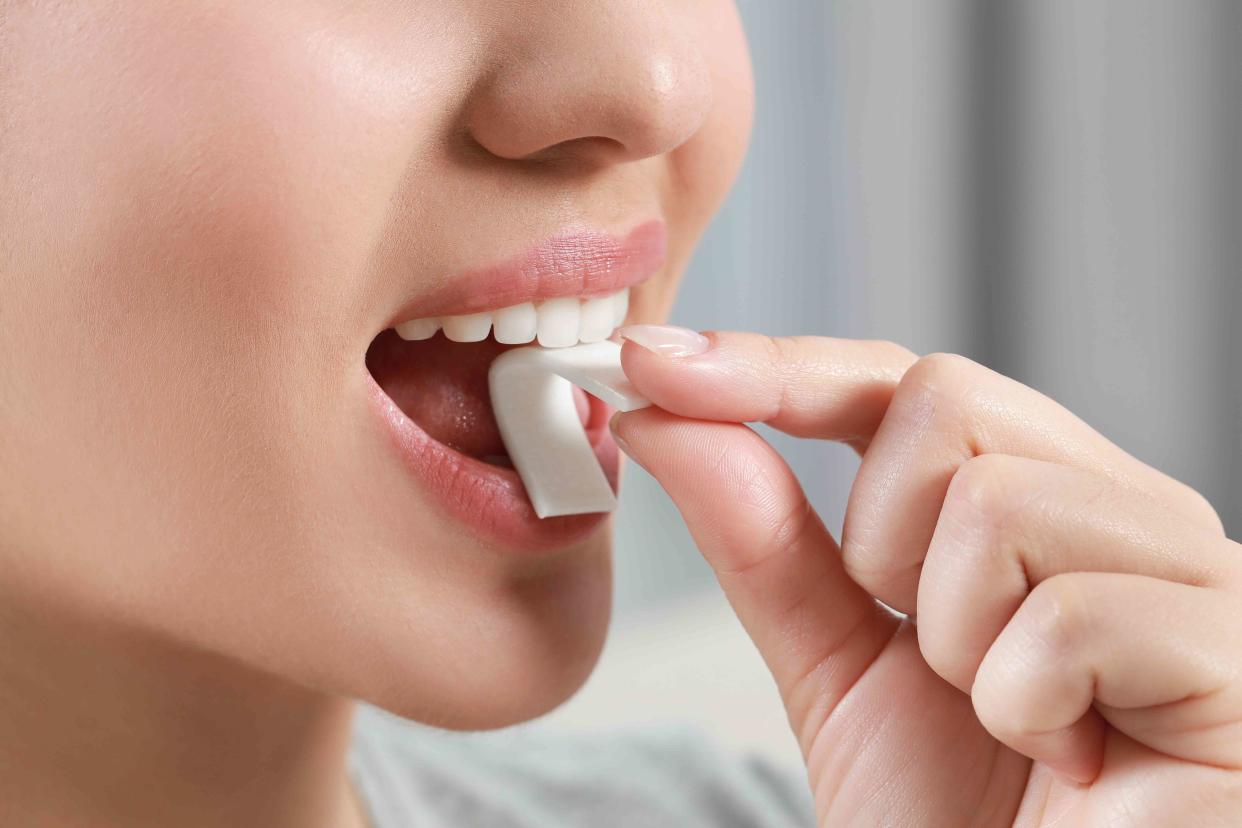Health Benefits of Xylitol Gum

Liudmila Chernetska / Getty Images
Medically reviewed by Simone Harounian, MSMedically reviewed by Simone Harounian, MS
Xylitol is a non-glycemic (won't raise your blood sugar) sweetener with a cooling aftertaste produced in plants, fruits, and vegetables. It can also be found in soft drinks, ice creams, jams, and other foods with artificial flavors.
It adds flavor to some of your favorite brands of minty gum and may also prevent tooth decay and bacteria that can cause tooth erosion. Chewing xylitol gum may also prevent dry mouth. Some people find xylitol gum helpful for focusing for long periods of time. The sweetener is most often absorbed in your small intestine and colon.
Prevents Cavity Causing Bacteria
Xylitol gum may help reduce streptococcus (a bacteria that causes cavities). Streptococcus produces acids in your mouth that can lead to cavities. In a small study, gum containing xylitol effectively reduced bacteria in the mouth.
Another study found that participants with a high risk of cavity lesions and gum infections found reduced bacteria after chewing gum with xylitol and magnolia. However, more research is needed to know how effective xylitol is.
May Help Prevent Dry Mouth
Xerostomia (dry mouth) is an uncomfortable feeling of dryness and a reduced flow of saliva in your mouth. Having a dry mouth increases your risk of tooth decay.
Saliva is a key component of your oral health. Consistent saliva flow in your mouth helps prevent food bits and plaque from sticking to your teeth. Saliva protects your teeth from erosion by maintaining your tooth's enamel with essential minerals like calcium, fluoride, and phosphate.
All kinds of chewing gum can stimulate saliva production. However, more studies are needed to confirm how effective xylitol gum is in increasing saliva production.
May Benefit Digestive Health
An increase in saliva production from chewing xylitol gum helps keep your digestive system working effectively. Saliva helps you swallow and clear acid from your mouth and esophagus, which relieves acid reflux and symptoms of gastrointestinal reflux disease (GERD). It also helps keep digestive juices flowing and stimulates peristalsis (muscle contractions that move food through the digestive tract).
Some studies have shown that chewing gum containing xylitol can help relieve constipation. Participants who chewed gum containing 2.40-2.74 grams (g) of xylitol in gum every 2 hours experienced normal bowel movements.
Chewing xylitol gum three times a day also helped participants with post-proctectomy (partial rectum removal). However, research on xylitol gum and its impact on bowel function is limited.
May Benefit Oral Health in GERD Patients
People with GERD are more at risk for dental erosion because of bouts of acid reflux. When acids go up to the esophagus, they may cause regurgitation as they travel to your throat. Frequent vomiting, acids from foods and drinks, and throat burn can also cause erosion.
Research suggests that plaque can form in as little as 20–30 minutes after eating. However, chewing stimulates saliva production and bicarbonate, reducing the effect of acids in your mouth after eating.
Eating too much sugar can increase your risk of cavities and trigger acid reflux. Researchers have considered xylitol as a replacement for sugar in diabetic foods. People with GERD can opt for sugar-free gums with xylitol to prevent acid reflux.
May Improve Focus and Attention
Chewing gum may increase alertness by making the brain more responsive to stimuli. This may explain why some people like to chew gum while working, studying, and driving. It also increases brain activity in the hippocampus for tasks that require attention for a long period of time.
Your hippocampus, which is located on the sides of your brain, is essential for spatial memory and learning. Several human studies have demonstrated that chewing xylitol gum preserves hippocampal function to delay the deterioration of old age. Chewing gum may also improve the ability to cope with stress.
Risks
Xylitol is an approved food additive in the United States and several other countries. It is generally recognized as safe (GRAS) by the U.S. Food and Drug Administration (FDA) in gums and other processed foods. In some people, it may cause slight bloating when chewing. Although not common, it is possible to develop an allergy to xylitol.
However, habitual and excessive chewing (over three hours per day) can lead to headaches and temporal-mandibular disorders (pain in your jaw muscles). This is especially true for people with preexisting health conditions affecting the jaw.
Avoid giving gum to children under 4 years old. Any type of chewing gum can be a choking hazard for them.
Tips for Chewing Xylitol Gum
When chewing xylitol gum consistently, it is recommended to opt for sugar-free options that are better for your teeth and prevent cavities. Sugar-free gum is also better for people with diabetes for blood sugar management.
Researchers recommend not chewing gum for over three hours daily to prevent headaches or jaw disorders like temporomandibular joint disorder (TMJ).
A Quick Review
Chewing xylitol gum may help prevent cavities, reduce the risk of tooth decay, and support your tooth enamel. It increases saliva production, which protects your teeth from bacteria and promotes digestion.
If you have GERD, chewing xylitol gum may help prevent acid reflux. However, to reduce your risk of jaw pain or headaches, do not chew gum for more than three hours daily. More research is needed to determine how effective chewing xylitol is for oral health.
For more Health.com news, make sure to sign up for our newsletter!
Read the original article on Health.com.
